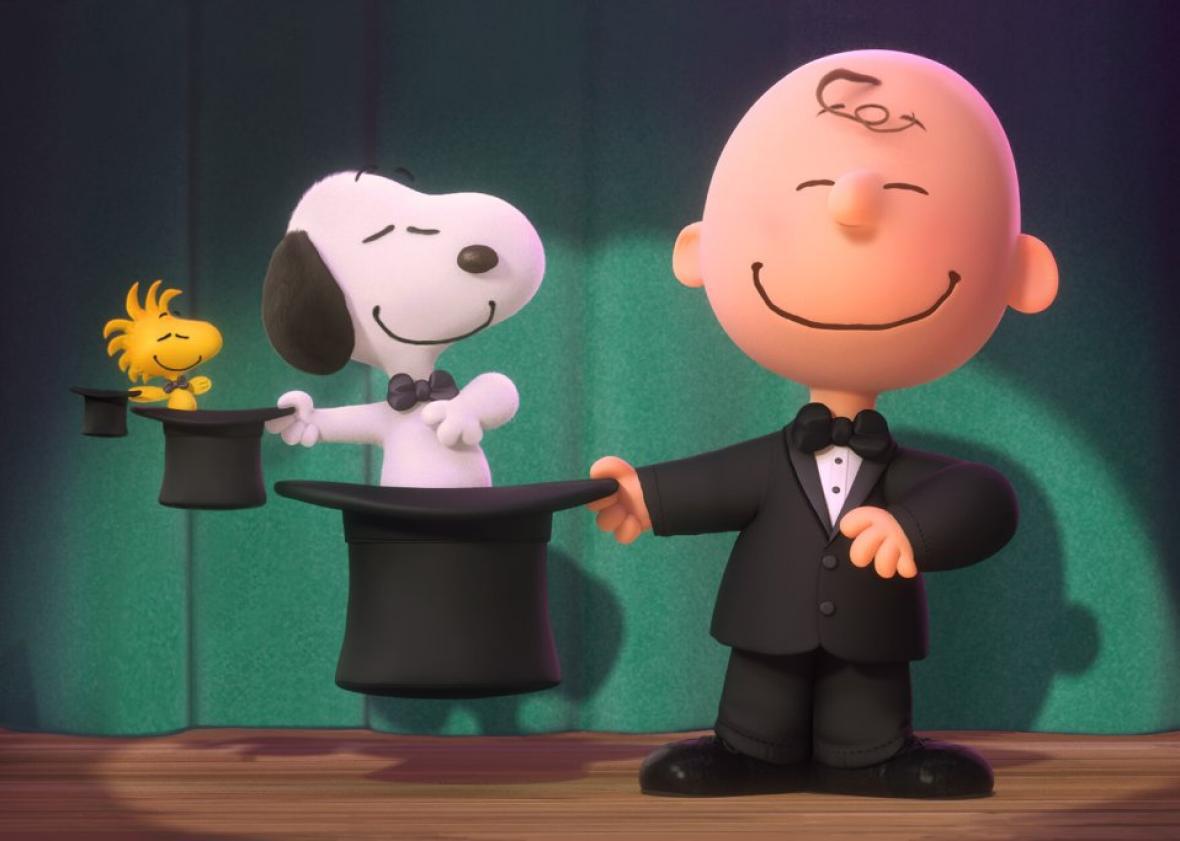Spoilers for The Peanuts Movie ahead.
Let’s start with the most important part: Despite everything I feared, The Peanuts Movie is not a fiasco. It is a little loud and stupid sometimes, but it also retains a great deal of the charm of both Charles M. Schulz’s strip and the best of Bill Melendez’s animated specials. Children will love everything about it and adults will spend much of the movie in a pleasurable haze of recollection: Oh yes, the kite-eating tree! Oh yes, the wah-wah voices of the adults (performed, unnecessarily but delightfully, by the jazz musician Trombone Shorty)! Woodstock’s frozen birdbath! Peppermint Patty snoring in class! The movie even lovingly replicates the characters’ typographically expressive eyeballs, ranging from single • • dots when at rest to (• •) when exercised to the curly apostrophes of the truly exasperated.
If the film, from animation studio Blue Sky, spends a little too much time on Snoopy’s imaginative adventures, well, so did Schulz in his later years. That’s a small price to pay for a Peanuts movie that, for the most part, moves at a less antic pace than most contemporary children’s animation, and even takes care to give minor characters the attributes they carried on the funny pages for 17,897 strips.
But as we walked out of the film, my delighted kids asked me if I had liked it, and I didn’t quite know what to say. I had liked quite a bit of it, but I couldn’t decide how the ending sat with me. Charlie Brown spends most of the movie being humiliated, mortified, embarrassed, made fun of, and scapegoated. This is proper. The role of Charlie Brown in the Peanuts universe is to be ever hopeful, and to be ever disappointed, like a Prometheus who awakens every morning and thinks, Well, surely today no eagle will descend from the heavens and devour my liver. Charlie Brown tries; he fails; he can’t stand it, he just can’t stand it; he tries again.
But The Peanuts Movie ends, unexpectedly, with Charlie Brown victorious. He overcomes obstacles to reach the bus upon which his beloved Little Red-Headed Girl is leaving for camp before it departs; she tells him she’s noticed all the kind things he’s done this year; she warmly explains, in front of the entire gang, that he has all the qualities she admires. The movie ends on this moment, of Charlie Brown succeeding and having his success recognized by everyone he knows, and even a mid-credits sequence of Lucy pulling the football away and Charlie Brown auuughing his way to earth couldn’t remove the bad taste from my mouth. Did this film, so careful to hew to the spirit of its source material, betray Schulz (and us) in its final moments? Is a Charlie Brown story with a happy ending really a Charlie Brown story?
While I mostly recall Charlie Brown’s plentiful failures—all the times he’s called a blockhead, all the baseball games he loses, all the anxieties he confesses to Dr. Van Pelt—it’s worth remembering that Charlie Brown did, sometimes, achieve success, however bittersweet. Often, that success came in the various adaptations of Peanuts to other media. Think of the end of A Charlie Brown Christmas, when Linus’ explanation of the true meaning of the holiday leads the gang to view Charlie Brown’s sad little Christmas tree in a new way. Or Charlie Brown’s smooch of the Little Red-Haired Girl in It’s Your First Kiss, Charlie Brown—though the next day he doesn’t remember it. The ending of the musical You’re a Good Man, Charlie Brown even seems to serve as a model for the final scene of the film, with even his greatest antagonist, Lucy, shaking his hand and acknowledging his worth.
But these cases weren’t examples of adaptors adulterating Charles Schulz’s vision. (Or at least, not entirely examples of that.) Charlie Brown succeeded every once in a while even in the comic strip. In later years, true, he succeeded more; in 1990s strips he defeated the marbles bully Joe Agate, and even hit a home run to lead his baseball team to victory. But even earlier in the strip’s history, success sometimes found Charlie Brown: he recovered a baseball signed by Joe Shlabotnik; he won a game against Peppermint Patty’s team (albeit by forfeit); he was voted camp president (albeit with a sack on his head). He never kicked that football, though.
In that light, I’ve reconsidered the ending of The Peanuts Movie, especially when I think about how happy it made not only my kids but pretty much all the kids in the theater. Charlie Brown isn’t rewarded on the baseball field or in the classroom or in the eyes of any of the wah-wahing adults whose opinions, in this world, truly don’t matter; instead, the movie remedies, for a moment, the greatest injustice readers of the comic have always known: that Charlie Brown is a good man unappreciated by those he wishes were his true friends. To see his worth acknowledged, no matter how unfamiliar the scene was, felt, in the end, lovely. Charles Schulz famously justified the endless failures of his most beloved character by observing that “winning is great, but it isn’t funny.” Most of The Peanuts Movie is very funny indeed. Its ending, however, isn’t funny—but it is pretty great.
